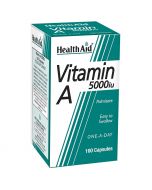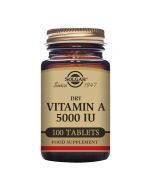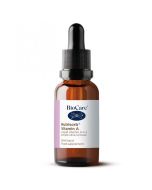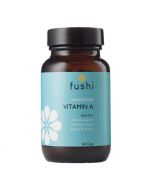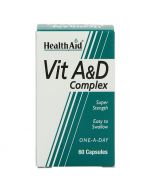
Vitamin A - Benefits and Risks
By Girish Desai Pharmacist (GPhC 2019217)
In this article we’ll explore, in depth, what Vitamin A is, how it works, how you can ensure that you are getting the adequate dose, the conditions that it can help with and any risks involved in supplementing it with your diet.
What Is Vitamin A & What Does It Do?

“Vitamin A” is the generic term for a group of unsaturated compounds that are essential to multiple functions of the body, particularly. As with all vitamins and minerals, Vitamin A is essential to the smooth operation of your bodily functions. It is primarily in charge of:
- Improving your vision in low light,
- Aiding your body’s immune system,
- Working as an antioxidant for healthy skin.
How Much Vitamin A Should I Get Per Day?

Vitamin A is found in so much of our diet that, in the West, it should be relatively easy to get all you need from your food - however, the amount that you need will alter depending on the stage you are at in life and your gender.
|
Age (years) |
Amount (micrograms (mcg)) per day |
|
1-6 |
400 |
|
7-10 |
500 |
|
11-14 |
600 |
|
15+ |
700 (boys) 600 (girls) |
These measurements should only really need to be adjusted if you are breastfeeding, when the recommended intake is upped to between 1200 and 1300 mcg per day to ensure that you are getting enough Vitamin A to your baby and for yourself.
Risks When Considering Vitamin A Intake:
Vitamin A During Pregnancy
If you are pregnant, high levels of Vitamin A can harm your unborn baby. While the usual daily recommended allowance should still be consumed by the parent to develop the baby’s growth, visual health and build immunity, too high a dose of vitamin A can cause liver toxicity and birth defects. It is for this reason that the NHS doesn’t recommend that you eat liver or pate during pregnancy and that you steer clear of any supplements with Vitamin A - including fish liver oil
(Old) Age and Vitamin A
According to some reports, there is evidence that overconsumption of vitamin A can affect the strength of your bones, causing them to become more likely to fracture as you get older. This is important for older people to consider, particularly those that have reached the menopause or who are already at risk of osteoporosis.
Too much Vitamin A: Hypervitaminosis A

Hypervitaminosis A, or vitamin A toxicity is caused when you have too much vitamin A in your body.
Causes:
Unless you live off a liver pate diet, it would be rare that you get too much vitamin A from a healthy diet. Vitamin A toxicity tends to be the result of overexposure to a vitamin A supplement when trying to treat certain conditions.
Symptoms:
Symptoms of hypervitaminosis A include:
- Blurry vision
- Dizziness
- Sensitivity to sunlight
- Bone pain or swelling
- Dry skin, cracked fingernails, cracks at the corners of your mouth
- Irritability
- Nausea and or vomiting
- Abdominal pain
- Confusion
- Pressure on the brain
- Hair Loss
Diagnosis:
Many of the symptoms above, however, can also be caused by other conditions. The only real way of determining a condition caused by too much vitamin A is by having a blood test. If you are concerned about your levels of vitamin A in you or your child, it is best to contact your doctor, discuss your diet, symptoms and medical history and use a blood test to confirm the levels of vitamin A in your body.
Too Little Vitamin A - Vitamin A Deficiency

Vitamin A deficiency in Western society is relatively rare given the amount of foods that vitamin A is present in. However, if have a liver disorder or other condition that means you are unable to absorb, store and transport vitamin A effectively, you may become deficient.
Conditions that affect the body’s ability to absorb, store or transport vitamin A include:
- Coeliac Disease
- Cystic Fibrosis
- Pancreatic Insufficiency
- Chronic diarrhoea
- Bile duct obstruction
- Giardiasis
- Cirrhosis
Vitamin A deficiency can affect your immune system, cause night blindness, affect fertility and growth in children, cause acne, dry eyes and skin. If you are concerned that you have a deficiency, you should consult your doctor.
How Do I Get Vitamin A?

Vitamin A Rich Foods:
In food, Vitamin A comes in two forms:
- Retinol or previtamin A - a yellowy fat-soluble substance is the form that is consumed through eating meat, fish, poultry and dairy products. Of particular note:
- Dairy Products
- Eggs
- Oily Fish
- Fortified low-fat spreads
- Liver and liver products such as liver pate
- Provitamin A, such as beta-carotene, which your body changes into Vitamin A - found in plant based products such as fruit and veg
- Spinach
- Carrots
- Sweet Potatoes
- Red Peppers
- Yellow Fruit such as mango, papaya and apricots
What Is Pate?
Pate is generally made from liver - a substance high in vitamin A, which means that it can be a great source of vitamin A, but also eating too much of it can mean you get too much - and in this case too much of a good thing can be bad as you risk vitamin A toxicity, also known as hypervitaminosis A. To avoid this you shouldn’t eat more than two portions of liver pate a week, according to the NHS.
Vitamin A Supplements & Creams
A balanced diet in Western society should be all that is required to get enough vitamin A. However, if you are suffering from any of the below, you may be advised by your doctor to consider vitamin A supplements. If you eat liver or liver pate more than once a week, you shouldn’t need to take any supplements.
Conditions That Vitamin A Supplements And Creams Can Treat:
- Acne
Using a topical form of Vitamin A, known as topical retinoids, has been proven to improve scarring and acne prone skin, but it is worth talking to a pharmacist or your dermatologist before selecting your product.
- Brittle Hair
Vitamin A, in the correct dosage, has a positive effect on your hair. Particularly in terms of its strength as it reduces breakage. Take a look at our series on hair supplements if you are concerned about the health of your hair.
- Eye Disease
Xerophthalmia, or ocular disease, can be caused by a vitamin A deficiency. In Ancient Egypt it was discovered that night blindness could be cured by eating liver, and it wasn’t until later that the relationship with liver and vitamin A was linked. Owing to the dangers of vitamin A toxicity, if you suffer from dry eyes or eye disease, it is worth talking to your optician and or doctor before using Vitamin A eye drops or supplements.
- Measles
A deficiency in Vitamin A has long been a risk factor associated with severe measles and the WHO recommends supplements of Vitamin A in areas where a child’s diet may be lacking. This should not normally be a cause for concern in the west, but worth being aware of.
Key Takeaways
As with all other vitamins and minerals, in the right amount, vitamin A is crucial to the smooth running of our bodies - particularly when it comes to our immune system and eye health. However, where our bodies often simply “flush out” too much of other nutrients, with the overconsumption of Vitamin A our health will suffer. In the Western world, unless we are subject to certain conditions, we should be able to get all the vitamin A we need from a balanced diet. Owing to the risks involved with taking too much, you should talk with your doctor, dermatologist or pharmacist if you are considering either oral Vitamin A supplements or topical creams and serums.
To learn more about how to get the right amount of vitamins and minerals to keep your body at its optimum performance, have a look at our vitamin and mineral glossaries.
Disclaimer
The products offered are not intended to diagnose, treat, cure, or prevent any illness or disease, or replace the advice of a medical professional. Results are not guaranteed and may vary from individual to individual.




